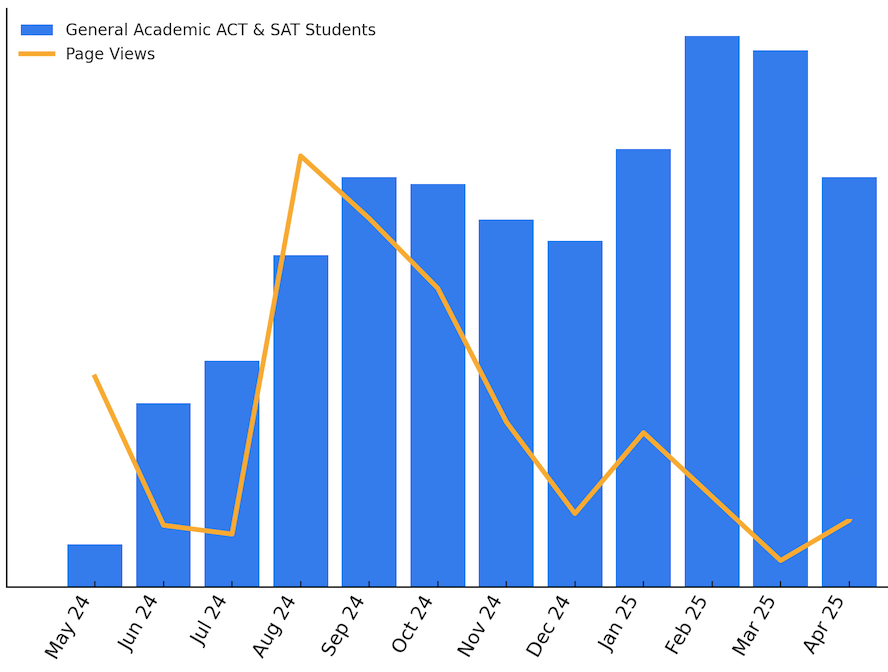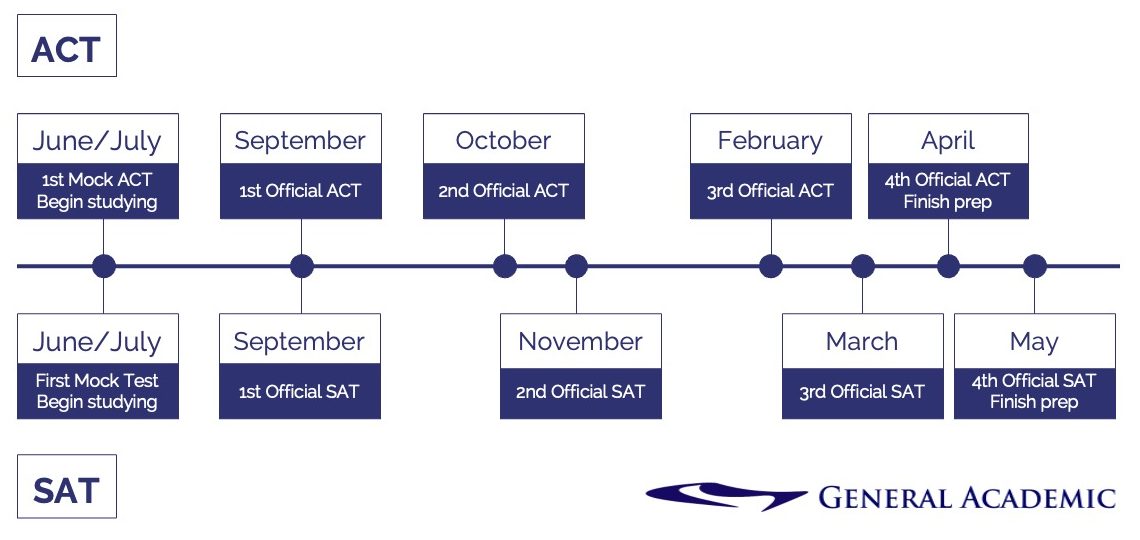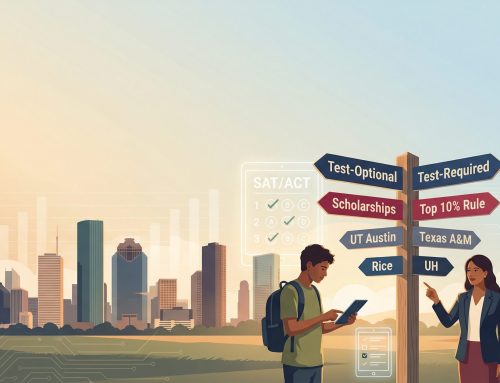One of the age-old questions of test prep is when to begin the process of studying. Different sources tend to have wildly different recommendations, especially for important tests taken by many students, like the ACT and SAT. There’s a tendency toward doomsaying–an idea that if students haven’t been preparing for years to take these exams that they’re already behind. But when do students actually start studying? In this article, we analyze data from Houston students about when they actually begin researching and preparing for college entrance exams.
Thousands of students research and prepare for the ACT and SAT with General Academic every year. Based on our data:
- Ambitious students start preparing the summer before their junior year
- The majority of students will have started prep by December of their junior year
- A second wave of students will come in by spring of their junior year
General Academic’s students generally complete two to three ACT or SAT tests by spring of their junior year, which allows them ample opportunity to earn the score they need. Most college applications are due in the fall or winter of a student’s senior year, meaning that we recommend families start prepping about a full year and a half before final college deadlines. The timeline may sound long, but when time is the most precious commodity in human development, students can rarely give themselves too much of it!
When do Houston Students Begin Preparing for the ACT and SAT?
Let’s take a closer look at the trends and insights of Houston-area students that General Academic have worked with over the past year:

The chart above tracks two different measurements: the page views of General Academic’s ACT and SAT tutoring web pages (denoted with the yellow line), and the number of students in their junior year of high school (beginning at the tail end of their sophomore year) actively engaged in ACT or SAT tutoring at General Academic (denoted with the blue bars), for a full year. We can glean some key insights from these data:
- Research begins in the Summer: Although some initial research into the ACT and SAT happens at the tail of the school year (likely in response to prompting from schools), it hits a lull until the end of summer, when there’s a large spike in August. This tells us that though students are thinking about the tests earlier, most don’t really start their research into the ACT and SAT until late summer before their junior year.
- Practice begins once school starts: When it comes to actual studying, there are some students who tutor through the summer. There’s an initial peak of tutoring in the fall, between September and October, that then tapers off until the new year, eventually hitting its peak between February and March.
From this, we can determine that by the fall of their junior year, most students have already researched the ACT and SAT and that many have begun studying for the exams. As the school year heats up and the holiday season begins, some pause their studying, though by the late winter and early spring, it is back in full swing–likely as students prepare to take their second official test in the late winter/early spring.
When should I start studying for the ACT/SAT?
Ideally, students should begin preparing for the ACT and SAT by the summer before their junior year. This will ensure that they have enough time to not only learn the structure and content of the tests but also to complete any retests that they might need before college application process begins in the summer before their senior year. We don’t recommend starting any earlier to prevent burnout and plateaued or decreased test scores.
This early preparation doesn’t mean that students have to jump into hours of study right away. Instead, they should begin by taking a diagnostic test to identify areas of strength and weakness. Then, they should plan to spend between 3-4 hours studying a week, until they get closer to their first test date. Afterwards, they can increase their practice time as needed based on the results of their first official test.
Why the emphasis on early preparation? Here are a few key reasons:
- Familiarity and Confidence: One of the most important factors to success on standardized tests is familiarity with the test itself and its tested content, which can only be gained through study. Students who are more familiar with the tests will be more confident on test day, which leads to stronger scores all around.
- Mastering Core Academics: Success on standardized tests like the ACT and SAT is heavily dependent on having a strong foundation in core academic subjects. No amount of tips and strategies can substitute for a deficiency in basic academic skills. If a student needs to brush up on certain concepts or skills, it’s crucial to allocate sufficient time for remediation.
- Allowing for Adequate Preparation Time: In life, having enough time is always better than feeling rushed and ill-prepared. Starting early will alleviate unnecessary stress and allow students to work around hiccups in their practice schedule. Always keep in mind that cramming for the ACT and SAT is not an effective strategy.
When should I take the ACT and SAT?
Historically, the most popular test dates in Houston for the ACT and SAT fall in the months of February and April for the ACT, and March and May for the SAT.
Both of these exams have about 7-8 scheduled testing dates for an entire year–students can sign up for as many of these dates as they want, as long as they have the time and can pay the registration fee ($68 for either test). In addition to the scheduled dates, many high schools will have certain school or district-wide testing days when all juniors are administered the SAT or ACT. This means that many students have upwards of 8-10 opportunities to take these tests in a year.
With all this opportunity, what is the best way to schedule official tests? We recommend that students plan to take the ACT and SAT at least two to three times, outside of whatever testing their school offers.
Ideally, students should plan to take their first official exam in September for both the SAT and ACT, preferably after they have been studying for at least two months. Regardless of how they score on these tests, they should plan to take another official test in February for the ACT and March for the SAT (both exams are offered again in December, but midterms can get in the way of prep). If they are satisfied with the second set of results, then this can be the end of their ACT and SAT prep. However, if they need to try one more time, then they can schedule another test in April for the ACT and May for the SAT.
Following this schedule will help ensure that students are satisfied with their test scores by the end of their junior year, freeing up the whole summer and fall to focus on college applications.
Again, we highly recommend that students plan to take the ACT and/or SAT at least 2-3 times. Multiple test attempts have been proven to help students consistently improve their scores. In fact, College Board found that 63% of students improved their scores on just their second attempt on the SAT.
Does Texas Require the ACT or SAT?
Many states across the country require students to take the ACT, SAT, or both as part of their graduation requirements. Texas does not have these requirements to finish high school, but school districts across the state still provide opportunities for campus-wide free testing. This gives underserviced students more opportunities to focus on academics and prepare for their futures without financial or locational hurdles. It’s important for students to know when these school test are being administered, and to factor them into their studying process.
ACT Test Dates 2025-2026
| Test Date | Registration Deadline | Late Registration Deadline |
| December 13, 2025 | November 7th | November 24th |
| February 14th, 2026 | January 7th | January 21st |
| April 11th, 2026 | March 6th | March 24th |
| June 13th, 2026 | May 8th | May 27th |
| July 11th, 2026 | June 5th | June 24th |
SAT Test Dates 2025-2026
| Test Date | Registration Deadline | Deadline for Changes, Cancellation, and Late Registration |
| November 8th, 2025 | October 24th | October 28th |
| December 6th, 2025 | November 21st | November 25th |
| March 14th, 2026 | February 27th | March 3rd |
| May 2nd, 2026 | April 17th | April 21st |
| June 6th, 2026 | May 22nd | May 26th |
How do I prepare for the ACT and SAT?
To ensure effective preparation, consider the following steps:
- Take a full-length practice test as a diagnostic tool. We offer these tests on most Saturdays for current and prospective clients. We now also offer Sunday testing at our Hedwig Village location as well.
- Review and reinforce math concepts tested on the ACT and SAT.
- Read extensively and practice proper grammar.
- Learn and practice fundamental test-taking strategies, including time management.
- Take a full-length practice test every 6-8 weeks to solidify knowledge and become familiar with the test format.
- Health is wealth: Eat well and get plenty of sleep to ensure both your mind and body are prepared for test day.
The average student should dedicate around 40-80 hours to ACT and SAT preparation, including both regular tutoring sessions and homework. Spreading this time over four to six months is ideal for 3-4 hours of dedicated work per week.
Preparing for the ACT and SAT with General Academic
For more guidance on tutoring or comprehensive prep guides tailored to these exams, reach out to General Academic for the region’s best at-home, in-office, and online tutoring!
Remember, early preparation sets the foundation for success. Start planning now to give your child the best chance to shine on the ACT or SAT and secure admission to the school of their dreams.
Read more about College Prep with General Academic





